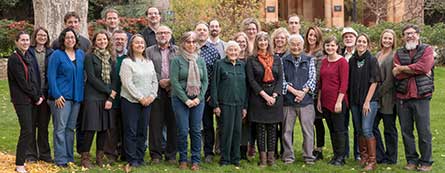Our Anthropology Department at California State University, Chico
The Anthropology Department was established during the 1967-1968 academic year and offers a Bachelor's of Arts (BA), a minor, four certificate programs, and a Master's of Arts (MA) in the discipline of anthropology. Since its inception, the department has had a strong four-field approach to the study of anthropology that includes Archaeology, Cultural, Physical, and Linguistic anthropology as well as a fifth field, Museum Studies. Our well-qualified faculty have specializations in one or more of the fields of anthropology.
Our department emphasizes hands-on education and has been recognized by the University for excellence as a High-Quality Learning Environment. We take pride in the rigorous standards and high quality of our curriculum and the educational opportunities we offer. Our curriculum is enhanced by a number of teaching laboratories: the Archaeology and Zooarchaeology Laboratories, the Advanced Laboratory of Visual Anthropology (ALVA), the Ethnography Laboratory, Heritage Resources Conservation Laboratory, the Human Identification Laboratory, and the Valene L. Smith Museum of Anthropology.
The educational experiences our program offers extend beyond the classroom into the field. Be it carrying out archaeological excavations, forensic recovery cases, ethnographic work in the U.S. and abroad, museum curation and collection management, or the production of documentary films, students acquire professional experience and skills they can take with them upon graduating.
Seven Goals of the Anthropology Department at CSU, Chico
- An understanding of the phenomenon of culture as that which differentiates human life from other life forms; an understanding of the roles of human biology and cultural processes in human behavior and human evolution.
- A positive appreciation of the diversity of contemporary and past human cultures and an awareness of the value of anthropological perspectives and knowledge in contemporary society.
- Knowledge of the substantive data pertinent to the several sub-disciplines of anthropology and familiarity with major issues relevant to each.
- Familiarity with the forms of anthropological literature and basic data sources and knowledge of how to access such information.
- Knowledge of the methodology appropriate to the sub-disciplines of anthropology and the capacity to apply appropriate methods when conducting anthropological research.
- The ability to present and communicate in anthropologically appropriate ways anthropological knowledge and the results of anthropological research.
- Knowledge of the history of anthropological thought.

